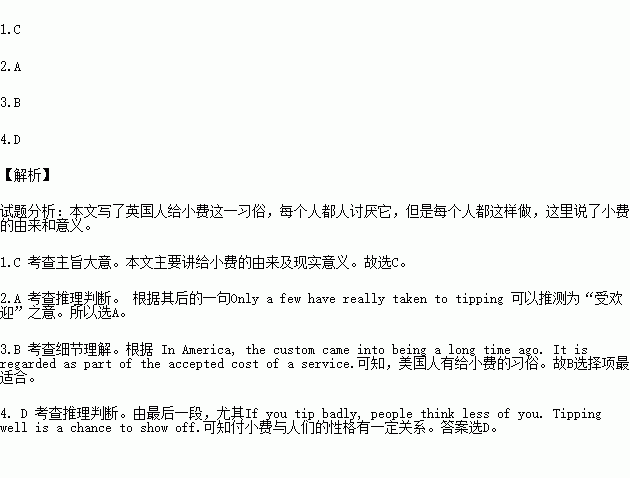题目内容
Everybody hates it, but everybody does it. A recent report said that 40%of Americans hate tipping. In America alone, tipping is a $16 billion-a-year industry. Consumers acting politely ought not to pay more than they have to for a given service. Tips should not exist. So why do they? The common opinion in the past was that tips both rewarded the efforts of good service and reduced uncomfortable feelings of inequality. And also, tipping makes for closer relations. It went without saying that the better the service, the bigger the tip.
But according to a new research from Cornell University, tips no longer serve any useful function. The paper analyzes numbers they got from 2,547 groups dining at 20 different restaurants. The connection between larger tips and better service was very weak. Only a tiny part of the size of the tip had anything to do with the quality of service.
Tipping is better explained, by culture than by the money people spend. In America, the custom came into being a long time ago. It is regarded as part of the accepted cost of a service. In New York restaurants, failing to tip at least l5% could well mean dissatisfaction from the customers. Hairdressers can expect to get l5%-20%, and the man who delivers your fast food $2. In Europe, tipping is less common. In many restaurants the amount of tip is decided by a standard service charge. In many Asian countries, tipping has never really caught on at all. Only a few have really taken to tipping.
According to Michael Lynn, the Cornell papers' author, countries in which people are more social or outgoing tend to tip more. Tipping may reduce anxiety about being served by strangers. And Mr. Lynn says, “In America, where people are expressive and eager to mix up with others, tipping is about social approval. If you tip badly, people think less of you. Tipping well is a chance to show off."
1. This passage is mainly about ________.
A. different kinds of tipping in different countries
B. the relationship between tipping and custom
C. the origin and present meaning of tipping
D. most American people hate tipping
2.Which of the following best explains the underlined phrase "caught on"?
A. become popular. B. been hated.
C. been stopped. D. been permitted
3.Among the following situations, in your opinion, who is likely to tip most?
A. A Frenchman just quarreled with the barber who did his hair badly in New York.
B. An American just had a wonderful dinner in a well known restaurant in New York.
C. A Japanese businessman asked for a pizza delivery from a Pizza Hut in New York.
D. A Chinese student enjoyed his meal in a famous fast food restaurant in New York.
4.We can infer from this passage that ________.
A. tipping is no longer a good way to satisfy some customers themselves
B. tipping is especially popular in New York
C. tipping in America can make service better now
D. tipping has something to do with people's character
do with people's character

